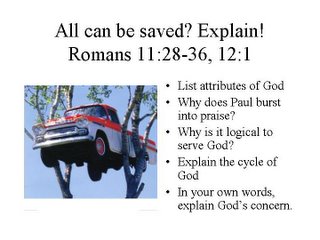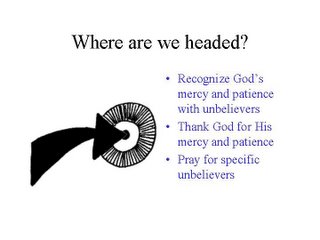Step 3 of this lesson “Call to Faith” is based on Romans 10:8-13. Illustrate the right way to God is by faith using the story of
“The Right Way to Peal a Banana”. Take a few bananas to class and after reading the focal verses ask, “What is the right way to peal a banana?” Call on a volunteer to demonstrate his technique. Then read the student’s tale as told in the story.
Like the strangeness of pealing a banana from the opposite end of the stalk, the Jews rejected the idea of salvation by faith. They thought their privileged position as children of Abraham would lead to automatic salvation, or they thought that keeping the commands of the law would provide salvation.
I think it is important to offer an opportunity for any member that desires to do so to “confess” out loud “Jesus is my God.” You never know how the Spirit might be leading, so don’t pass on an opportunity for an invitation! Try it this Sunday in your class.
P.S. Future lesson titles are posted below as a head’s up on what’s coming from Lifeway.
Explore the Bible
Spring 2006 Study Theme: Isaiah, Micah: Trust the Living Lord
UNIT 1: Trust in the Lord's Faithfulness
March 5: Do You Rebel? (Isa. 1:2-5,11-20)
March 12: Do You Volunteer to Serve? (Isa. 6:1-11)
March 19: Do You Take God at His Word? (Isa. 7:1-14,16)
March 26: Do You Think You Are Unaccountable? (Isa. 17:1-3,7-9; 18:1-7)
April 2: Do You Live According to God's Truth? (Isa. 28:14-18; 30:12-18)
April 9: Do You Take Your Burdens to the Lord? (Isa. 37:10-12,14-20,33-37)
April 16: Do You Share the Good News? (Easter Evangelistic lesson) (Matt. 28:1-10,16-20)
UNIT 2: Find Hope in God's Greatness
April 23: Take Comfort in God's Strength (Isa. 40:1-8,10-11,27-31)
April 30: Worship No Other (Isa. 44:16-22; 46:1-5,8-9)
May 7: Recognize God's Ways (Isa. 53:1-12)
May 14: Accept God's Free Offer (Isa. 55:1-13)
May 21: Get Real (Isa. 58:3-14; Mic. 6:8)
May 28: Praise Our Incomparable God (Mic. 7:8-20)
 To close this lesson “Live in Worship” based on Romans 12:1-8, ask members to recall a time when they served God and others. Ask how it made them feel afterwards? Can they identify what spiritual gift they exercised? Do they still possess that same spiritual gift today? Can we lose a spiritual gift? Can we change spiritual gifts?
To close this lesson “Live in Worship” based on Romans 12:1-8, ask members to recall a time when they served God and others. Ask how it made them feel afterwards? Can they identify what spiritual gift they exercised? Do they still possess that same spiritual gift today? Can we lose a spiritual gift? Can we change spiritual gifts?







































